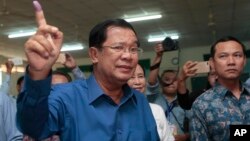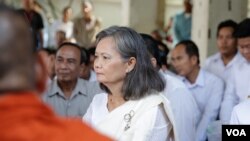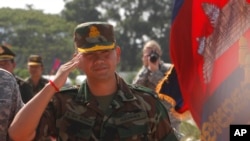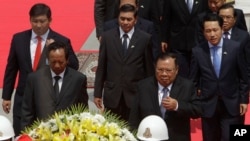In recent months, social media users in Cambodia have been able to get an unusual glimpse into the private life of their long-serving Prime Minister.
Hun Sen, who oversaw Cambodia’s emergence from civil war and has dominated it for 32 years through skill and force, has been sharing personal and intimate family moments in pictures and videos on his Facebook page.
One post shows him posing for a selfie with supporters while driving a passenger vehicle - a change from his usual bullet-proof SUVs. Another post on his page, which has some 8.5 millions followers, shows him with his family visiting a shopping mall overseas.
The premier turned 65 on August 5 and it appears he is increasingly active on social media to show the public he is likable, relaxed and - above all - healthy. The strongman once vowed to rule Cambodia until he is 74, and with the 2018 general elections coming up he seems keen to quell any rumors that he is ill or aging.
A recent picture shows him exercising in a gym with comment: “Every evening I have to exercise by cycling on this machine and walking on a treadmill… because it is hard to go golfing in the rainy season.”
DISPELLING HEALTH RUMORS
In May, reports emerged that Hun Sen had been flown to Singapore for medical treatment, prompting a flurry of online rumors about his condition, with some people voicing concern and others scorn.
Photos were soon released on Hun Sen’s Facebook page of him lying in a hospital bed surrounded by his children and grandchildren, with the explanation that he was only being treated for exhaustion.
Speculation about his health surged again in late June when he canceled a few weekly Council of Ministers’ meetings. In a speech last week, the premier said he heard rumors claiming he was terminally ill or had already passed away.
“Most of these rumors come from opposition members,” Hun Sen claimed at a graduation ceremony in Phnom Penh, before threatening that the military would not tolerate the spread of disinformation. “Therefore, if the opposition leaders do not control this issue (they) will be in danger the most,” he said.
GROWING OPPOSITION
Mu Sochua, vice president of opposition Cambodia National Rescue Party (CNRP) denied any involvement, adding that the party was busy with preparing for next year’s elections and training their newly elected commune councilors.
“The CNRP has time and again said it’s not responsible for any opinions that run counter to the party’s policy of (promoting) democracy, protecting people’s right, non-violence, and justice,” she said.
“The CNRP has no time to disseminate any other information,” she told VOA Khmer.
Opposition to Hun Sen’s rule has been growing in recent years and a large, young voter base is getting more of their information online, where the ruling Cambodian People’s Party-owned media have less control.
The CPP narrowly won the 2013 general elections in a disputed results that sparked large protests. In this year’s commune election the CPP also lost some ground to the CNRP of Kem Sokha.
PREPARING A HUN DYNASTY?
Another challenge that Hun Sen and his family face as he grows older could come from within his own ranks. Senior party members may try to claim power from Hun Sen or oppose his sons, who are being groomed for leadership roles and could succeed him.
Sebastian Strangio, a journalist, and author of Hun Sen’s Cambodia said that, barring any health problems, Hun Sen is likely to rule for many years to come, though it seems he is preparing for his succession.
“I think Prime Minister Hun Sen is readying a dynastic succession plan. It’s clear that he wants to hand over the power to one of his sons,” he told VOA Khmer.
Hun Sen's oldest son, Hun Manet, is seen as a likely successor. Hun Manet is a Cambodian army lieutenant general who heads the Defense Ministry's counter-terrorism department and is the commander of his father's several thousand-strong Bodyguard Unit.
Hun Manet has been steadily raising his political profile in both Cambodia and abroad in recent years. Another son, Hun Many, is a CPP MP, while a third son, Hun Manith, is an army brigadier-general. Hun Sen’s daughter, Hun Mana, controls a major media company.
Strangio said, “The question is: Are any of his sons in a position to take over? Are they prepared enough? Are they skilled enough at politics? And the second question is: Would the rest of the party accept that decision?”
PARTY REMAINS SILENT
Among those party members who could be vying for influence once Hun Sen’s power wanes are the two CPP deputy presidents, Say Chhum and Sar Kheng, who also hold the respective Senate President and Interior Minister positions. Defense Minister Tea Banh is seen as another potential contender.
However, discussions of succession planning are sensitive in Cambodia and members of the CPP - of which Hun Sen has also been the president since 2015 - have remained largely silent on the issue.
“We know that no one lives an eternal life,” Sous Yara, CPP lawmaker, and a new central committee member acknowledged, before stopping short of discussing the succession issue.
CPP spokesman Sok Isan said the party had a joint decision-making structure and dismissed questions on whether Hun Sen was planning a political dynasty as coming from “politically biased” sources.
“The nomination of a prime minister candidate is not decided by one or two individuals. It depends on the party congress to decide,” Sok Isan said.
Cambodian Ambassador to the US Chum Bunrong echoed this point: “Not every (position) is nominated by one individual, but by the party through both secret and open selection (procedures) to make sure that it can be accepted by all,” he said.











